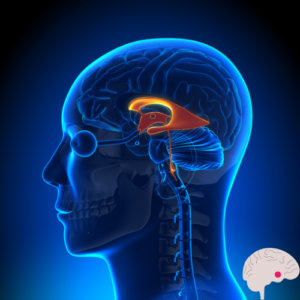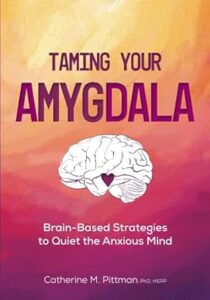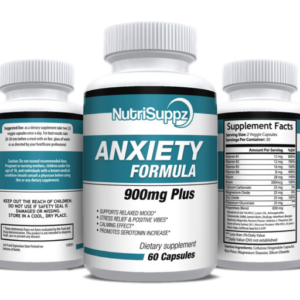01 Sep Unveiling the Amygdala: Its Impact on Anxiety
Unveiling the Amygdala: Its Impact on Anxiety
Nestled deep within the brain, the amygdala is a small but mighty player in our emotional landscape. This almond-shaped cluster of neurons is integral to how we process emotions, particularly fear and anxiety. At NutriSuppz, we’re dedicated to exploring the profound connection between the amygdala and anxiety. In this post, we’ll dive into how the amygdala shapes our emotional responses and provide actionable strategies to support its health for a more balanced state of mind.
The Amygdala: The Brain’s Emotional Sentinel
The amygdala is part of the brain’s limbic system and is situated in the temporal lobe, just above the brainstem. It’s best known for its role in emotional processing and memory formation. As a crucial component in evaluating emotional stimuli, the amygdala helps us detect potential threats and react accordingly. Its role extends beyond fear; it also influences how we respond to pleasure, stress, and various emotional experiences.
The Amygdala’s Role in Anxiety
The amygdala is central to the body’s stress response. When faced with a stressful situation, it activates the “fight or flight” response by signaling other brain regions and releasing stress hormones like cortisol and adrenaline. This reaction heightens alertness and prepares the body for action.
However, an overactive amygdala can lead to heightened anxiety. When this small cluster of neurons becomes overly sensitive, it may trigger exaggerated fear responses and chronic anxiety. This can manifest as excessive worry, heightened sensitivity to stress, and an inability to relax. On the flip side, an underactive amygdala may struggle to recognize genuine threats, potentially leading to increased anxiety disorders due to a lack of proper response.
Signs of Amygdala Imbalance
An imbalanced amygdala can have noticeable effects on both your emotional and physical state. Common signs include:
- Heightened Anxiety: Persistent and intense feelings of anxiety or fear, often disproportionate to the actual threat.
- Overwhelming Fear Responses: Strong fear reactions to situations that do not pose a significant risk.
- Challenges with Relaxation: Difficulty unwinding or feeling at ease, even in calm environments.
- Emotional Instability: Sudden or unexplained changes in mood, often triggered by minor stressors.
Recognizing these symptoms can be the first step in addressing potential amygdala dysfunction and its impact on anxiety.

Strategies for Supporting Amygdala Health
Maintaining a healthy amygdala involves a multifaceted approach that encompasses lifestyle changes and self-care practices. Here’s how you can support optimal amygdala function:
Engage in Regular Physical Activity: Exercise is a powerful tool for regulating stress hormones and enhancing mood. Activities such as jogging, cycling, or yoga can help manage anxiety and support emotional balance.
Adopt a Nutrient-Rich Diet: A well-rounded diet plays a crucial role in brain health. Incorporate foods high in antioxidants, omega-3 fatty acids, and B vitamins to support emotional stability and cognitive function. Consider foods like berries, fatty fish, and leafy greens.
Prioritize Quality Sleep: Consistent and restful sleep is vital for emotional regulation. Aim for 7-9 hours of sleep per night to help maintain a healthy amygdala and manage anxiety effectively.
Practice Stress Reduction Techniques: Techniques such as mindfulness, meditation, and deep-breathing exercises can help regulate stress responses and support a balanced amygdala. Regular practice of these techniques can foster a more resilient emotional state.
Beneficial Supplements for Amygdala Health
Several supplements can support the health of the amygdala and aid in anxiety management:
- Adaptogenic Herbs: Herbs like ashwagandha and Rhodiola rosea are renowned for their stress-reducing properties and can help balance cortisol levels.
- Omega-3 Fatty Acids: Found in fish oil, omega-3s support brain health and reduce inflammation linked to anxiety.
- Magnesium: Essential for neurotransmitter function, magnesium can help calm the nervous system and improve stress resilience.
- B Vitamins: Vital for brain health, B vitamins, especially B6 and B12, play a role in regulating mood and emotional responses.
Innovative Insights into Amygdala Health
Cutting-edge research offers new perspectives on maintaining amygdala health. Neurofeedback, for instance, is a technique that helps individuals learn to regulate brain activity, potentially improving emotional responses and reducing anxiety. Additionally, understanding the gut-brain connection reveals that a healthy gut microbiome can positively influence emotional health. Probiotics and prebiotics that support gut health may also benefit amygdala function and reduce anxiety levels.
Conclusion
The amygdala is integral to our emotional responses and plays a crucial role in managing anxiety. By understanding its functions and implementing strategies to support its health—through lifestyle choices, dietary adjustments, and targeted supplements—you can enhance your ability to handle stress and improve overall well-being. For premium supplements and resources designed to support emotional health, visit NutriSuppz and discover products tailored to your needs.






No Comments